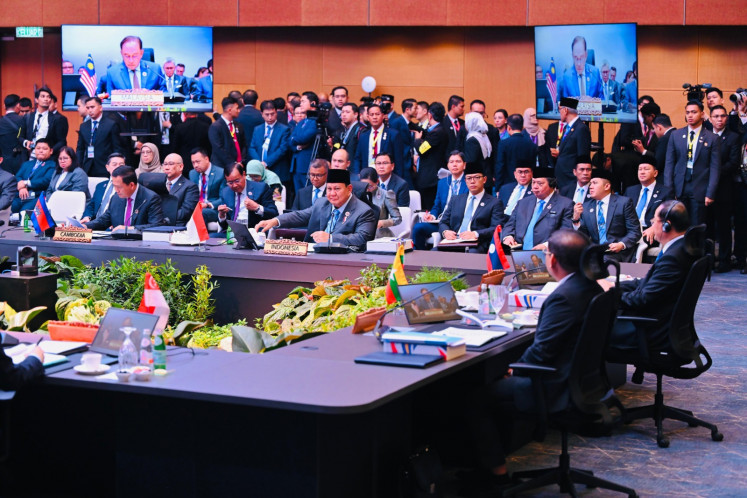Jeannie Mai Celebrating Asian women’s potential
Courtesy of NBCUniversal International NetworksDespite growing up as the daughter of Vietnamese immigrants who entered the United States by boat, Jeannie Mai never felt ashamed of her background
Change text size
Gift Premium Articles
to Anyone

Courtesy of NBCUniversal International Networks
Despite growing up as the daughter of Vietnamese immigrants who entered the United States by boat, Jeannie Mai never felt ashamed of her background.
Instead, she set a high bar for herself, to successfully bring out her exuberant personality and bold fashion style in the US.
“My mom emigrated from Vietnam two years before I was born. She didn’t speak the language and didn’t have any money, but she advised me to have style to get people’s attention,” said the fashion expert, who is also a host of a television channel program How Do I Look? Asia, after a recent event in Jakarta.
“If you have great personal style, people will immediately respect you because you look like you take care of yourself.”
Jeannie recalled one fine day in San Jose, California, where she grew up with her two younger brothers in a neighborhood of non-Asian families.
At that time, she and her mother were the only Vietnamese women living in the middle of a Hispanic and Caucasian environment. While the other American families did barbeques and ate burgers in their station wagons, her mother cooked Asian dishes.
“People were like ‘What is that smell coming from the house?’ But my Mom, Mama Mai, invited everybody into our house, asked them to sit and introduced them to eating just like an Asian family did,” she explained.
Mama Mai, she added, also told her not to follow others in creating a fashion style. Instead, Mama Mai advised her to make her own clothing that would enhance Jeannie’s personality and make her unique self come alive.
“And that’s the best way. Your style is your business card. So, don’t worry about not having any money, not having great body, or not being famous,” she said.
Definitely, she had inherited her confidence from her mother and she was so proud of it.
“I was raised by a woman who taught me to take care of myself first. Then, everybody will respect you the way you deserve to be respected,” Jeannie said.
This paradigm, according to her, is quite different in Asia. An Asian woman is used to taking care of others — from husband to children — and doing all the domestic work, but not having enough time for herself.
So, Jeannie thought that Asian women needed to be more in the spotlight.
“They must be respected more for who they are and then for what they do,” she said, adding that it was her mission as a host of How Do I Look? Asia.
How Do I Look? Asia is one of the TV programs aired by entertainment channel DIVA, a division of the NBCUniversal International Networks. It is actually an extended and Asian version from the original How Do I Look? US, which targets American audiences.
After successfully hosting the latest season of the How Do I Look? US, Jeannie continued hosting How Do I Look? Asia. This year, the Asian version of the program, first produced in 2015, has entered its third season.
“The presence of Jeannie has become an important element for the success of this show marked by the number of viewers, advertisers and affiliate partners in the Asian region,” the managing director of NBCUniversal International Networks, Christine Fellowes, said.
To add a local nuance, NBCUniversal International Networks also invited several local guest stylists to help Jeannie transform the participants’ looks on How Do I Look? Asia.
Some of them include Malaysian artist Elfira Loy, Philippine TV personality Joey Mead King, Vietnamese influencer Pham Hong Van Thuy and a well-known chef from Indonesia, Farah Quinn, who is famous for her sexy and feminine fashion style.
Farah said it was an honor for her to join the makeover TV show as guest stylist, saying that fashion and cuisine have something in common.
“Working with food in a way is also the same as with fashion: You have to get that vision of what looks good and not. So, it’s connecting,” Farah explained, adding that she was proud to use her vision to make the participants, or so-called victims in the show, look smashing.
Jeannie said the makeover program was different from other similar ones because of its non-volunteer methods.
The makeover “victims” come to the show not on their own, but after being elected by the close people around them, she said.
“So, imagine if you show up, unexpectedly seeing your boss, your boyfriend, maybe your best friends telling you, ‘Honey, I love you, but I want you to change because you don’t match the inside with the outside’,” she says.
She said at first the show would be really tough on the “victims” — most would hate her for wanting to change them without knowing who they really are. “OK, I break them down a little bit in order to get them to build themselves back up,” Jeannie says.
The show also presented unique and distinctive equipment in the shape of a tube that sucks unwanted or undesirable clothes off the “victims.”
The stylist, then, provides them with a selection of new clothes. However, in the end, the “victims” are the ones who decide what style they want to wear.
“At the end of the day, I don’t care [about] their fashion or what brand they are wearing. It’s not about that at all. I care they see their worst and that they are progressing to the next level,” Jeannie said.
Jeannie then gave an example. Melati, who works for an Indonesian ride-hailing application company and a winner from the previous season. In her eyes, Melati had so much power within her.
“She has such a strong personality and you can see that the minute you meet her, but you can’t tell behind that jeans and T-shirt.”
In the show, Jeannie transformed Melati and few months after the show she was told that Melati got a promotion.
Jeannie said what happened to Melati is actually what she hopes to accomplish through How Do I Look! Asia: celebrating Asian women’s potential.
“Women in Asia [in general] live in a safe zone. They live in the zone of what they are comfortable with and that is a dangerous world because you don’t experience the best part of your life. So, do something that scares you every single day and transform yourself.”









